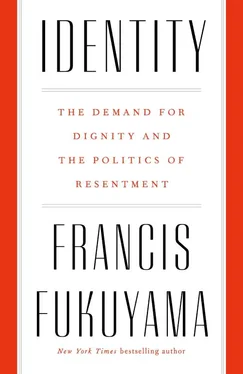That the distinction between an inner and an outer self emerged in Europe between the Reformation and the French Revolution was not an accident. European society was undergoing a series of profound economic and social changes that created the material conditions by which such ideas could spread.
All human societies socialize their members to live by common rules; human cooperation, and hence human success as a species, would not be possible otherwise. All societies have had rebellious teenagers and misfits who didn’t want to accept those rules, but in this struggle, society almost always wins out by forcing inner selves to conform to external norms.
Hence the concept of identity as it is now understood would not even arise in most traditional human societies. For much of the last ten thousand years of human history, the vast majority of people lived in settled agrarian communities. In such societies, social roles are both limited and fixed: a strict hierarchy is based on age and gender; everyone has the same occupation (farming or raising children and minding a household); one’s entire life is lived in the same small village with a limited circle of friends and neighbors; one’s religion and beliefs are shared by all; and social mobility—moving away from the village, choosing a different occupation, or marrying someone not chosen by one’s parents—is virtually impossible. Such societies have neither pluralism, nor diversity, nor choice. Given this lack of choice, it did not make sense for an individual to sit around and brood over the question “Who am I, really?” All of the characteristics that make up an inner self are fixed. One could perhaps rebel by running away to another village, but there one would find oneself trapped in an identical limited social space. There was no concept of “society” standing outside the individual, limiting a person’s choices, and no valorization of an inner self over that society.
All of this began to change as a broad modernization took hold in Europe. A commercial revolution was unfolding that vastly expanded trade and began to upend established social hierarchies. Adam Smith argued in The Wealth of Nations that “the division of labour is limited by the extent of the market”; as markets grew through technological change, new occupations appeared and different social classes emerged. Cities were growing in power and independence, cities that served as havens for peasants seeking to escape the tyranny of their lords. The Reformation set off a century and a half of religious warfare that scrambled the political map of Europe. It opened up possibilities for religious choice in ways that had not been possible under the medieval Church. Invention of the printing press led to the spread of literacy and the rapid diffusion of new ideas.
These broader social and economic changes meant that individuals suddenly had more choice and opportunity in their lives. In the old society, their limited social choices determined who they were on the inside; with new horizons opening up, the question “Who am I?” suddenly became more relevant, as did perceptions of a vast gulf that existed between the inner person and external reality. Ideas shaped the material world, and the material world created conditions for the spread of certain ideas.
4
FROM DIGNITY TO DEMOCRACY
The modern concept of identity unites three different phenomena. The first is thymos, a universal aspect of human personality that craves recognition. The second is the distinction between the inner and the outer self, and the raising of the moral valuation of the inner self over outer society. This emerged only in early modern Europe. The third is an evolving concept of dignity, in which recognition is due not just to a narrow class of people, but to everyone. The broadening and universalization of dignity turns the private quest for self into a political project. In Western political thought, this shift took place in the generation after Rousseau, through the philosophers Immanuel Kant and particularly Georg Wilhelm Friedrich Hegel.
According to Socrates, dignity was demanded primarily by the political community’s warriors who exhibited courage and were willing to risk death in public service. That is one understanding of human dignity, but there are others. In the Bible’s book of Genesis, Adam and Eve exist in a state of innocence until the serpent tempts Eve with a fruit from the Tree of the Knowledge of Good and Evil. Upon eating the fruit, they immediately see their nakedness and are ashamed of it and try to cover it up. God banishes them from the Garden of Eden for this transgression of his commandment, and the human race thereafter lives in the fallen condition proceeding from this original sin.
The Christian concept of dignity has revolved around this capacity for moral choice. Human beings are able to distinguish between good and evil; they can choose to do good, even if they often, like Adam and Eve, do not do so. Luther’s justification by faith was simply an expression of this choice. And though Adam and Eve made the wrong choice, their choice would be meaningless if they were not capable of sinning. By eating the fruit, they established their moral status and that of their descendants, who would henceforth know the difference between good and evil and be able to choose. Animals are incapable of knowing good and evil since they operate on instinct, while God in a sense is pure goodness and always chooses rightly. The human capacity for choice gives people a higher status than that of animals since it partakes of God’s capacity for goodness, yet is less than that of God since people are capable of sin. In this sense, in the Christian tradition, all human beings are fundamentally equal: they are all endowed with an equal capacity for choice. The centrality of moral choice to human dignity was underlined by the Baptist minister Martin Luther King, Jr., when he said, “I have a dream that my four little children will one day live in a nation where they will not be judged by the color of their skin but by the content of their character”—i.e., by the moral choices made by their inner selves, and not by their external characteristics.
Immanuel Kant presented a secular version of this Christian understanding of dignity in his Critique of Practical Reason and other writings such as his Groundwork to a Metaphysics of Morals . He asserts that we can point to nothing as unconditionally good other than a good will—that is, the capacity for proper moral choice. But Kant did not see this in religious terms; moral choice for him consists of the ability to follow abstract rules of reason for their own sake, and not for instrumental reasons having to do with the outcomes such choices imply for human well-being or happiness. The human capacity for moral choice means that human beings are not machines subject to the laws of physics, as Hobbes suggested; they are moral agents who can choose independently of their material environment and, for that reason, need to be treated not as ends to other means, but as ends in themselves. Morality is not a utilitarian calculus of outcomes that maximize human happiness, but about the act of choice itself. For Kant, human dignity revolves around human will, that human beings are genuine agents or uncaused causes.
The philosopher Hegel accepted this link between moral choice and human dignity; human beings are morally free agents who are not simply rational machines seeking to maximize satisfaction of their desires. But unlike Rousseau or Kant, Hegel put recognition of that moral agency at the center of his account of the human condition. In The Phenomenology of Spirit , he argued that human history was driven by a struggle for recognition. The demand comes initially from a warrior who is willing to risk his life in a bloody battle, not for territory or wealth, but simply for recognition itself. But this recognition ultimately fails to be satisfying because it is the recognition of a slave, that is, of someone without dignity. This problem can be solved only when the slave acquires dignity through labor, through the ability to transform the world into a place suitable for human life. The only rational form of recognition is ultimately the mutual recognition of master and slave of their shared human dignity.
Читать дальше












